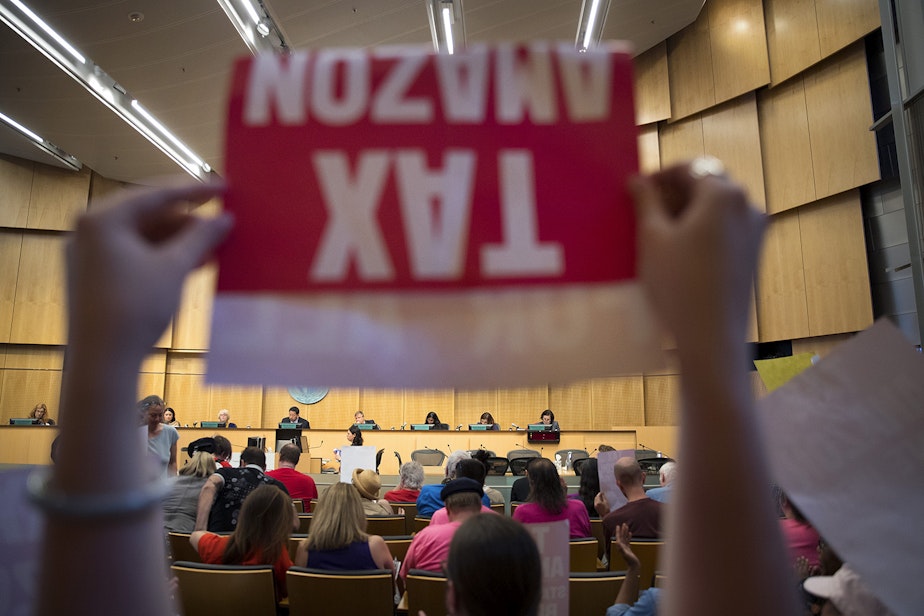Off with the head tax: Seattle councilmembers back off controversial plan

It only took the Seattle City Council four weeks to double-back on their vote to tax big businesses in order to pay for affordable housing and homelessness services.
In a statement released this afternoon, Mayor Jenny Durkan and the majority of the City Council—including three of the original head tax sponsors, Councilmember Mike O’Brien, Councilmember Lisa Herbold, and Councilmember Lorena González—announced they would convene this week to discuss repealing the controversial legislation.
Read More: Immigrant moms in SeaTac prison 'could hear their children screaming' “It is clear that the ordinance will lead to a prolonged, expensive political fight over the next five months that will do nothing to tackle our urgent housing and homelessness crisis,” the statement read.The repeal is up for a vote on Tuesday.Councilmember Mike O’Brien, one of the original sponsors of the head tax legislation, has faced some of the harshest backlash in community town halls for his support of the measure. Today, O’Brien said the business community applied much of the pressure that resulted in this decision.“There's no doubt that business pressure has shifted my view,” he said. “Business put pressure on the public, and the public put pressure on us.”
Read More: We photographed Ericka when she was a sex worker. This is her life now O'Brien said he also worried the head tax could become an issue in Democrats' reelection campaigns across the state — though he still thought a head tax was the best solution he had seen to fund subsidized housing. “It looked like Republicans would make the Seattle employee hours tax a campaign challenge in swing districts around the state,” O’Brien said.“That could result in a couple of things: It could result in Republican controlling and overriding us, or it could result in Democrats agreeing that they don’t want Seattle having the employee hours tax and taking it away from us.”In early May, Democrat state Senator Mark Mullet (D-Issaquah) demanded that the Seattle City Council drop the head tax. Other Democrats joined him, including Senator Guy Palumbo (D-Maltby), who said that there would likely be bipartisan support for a proposed bill from Senator Mark Schoesler (R-Ritzville) to ban employee head tax measures across the state.Councilmember Lisa Herbold, another original sponsor of the head tax legislation, said that the Chamber of Commerce successfully convinced the public of a “misleading narrative.”She continued:
The Chamber of Commerce has convinced the vast majority of Seattleites 1) of the tired, old conservative trope that increased levels of human suffering we see in our city is caused by government inefficiency rather than by the Gilded Age level income inequality in Seattle and elsewhere, and 2) that leading first with a regional funding approach, reliant on higher property or sales taxes for all taxpayers, is preferable to resources from those most benefiting from income inequality in Seattle paying their fair share.
Sponsored
A poll organized by opponents of the head tax found that 54 percent of Seattleites opposed the measure. Head tax opponents were scheduled tomorrow to turn in the necessary signatures to put the head tax to a referendum vote come November.
Two councilmembers were not included in the statement announcing the reversal of the head tax, however: Councilmembers Teresa Mosqueda and Kshama Sawant.
“My office has heard a lot of concern regarding the Employee Hours Tax (EHT),” Mosqueda said in an e-mailed statement. “I have concerns as well, but I cannot back a repeal without a replacement strategy to house and shelter our neighbors experiencing homelessness.”
At a council meeting on Monday, Sawant said: "I have a news flash for the elected officials who actually supported this tax, on May 14, but are now capitulating to Amazon: This fight was never going to be easy."
The head tax signed into law by Mayor Jenny Durkan on May 16 was significantly smaller than the head tax proposed by the City Council’s Progressive Revenue Task Force.
Sponsored
The task force, which was formed to study how to pay for the city’s homelessness crisis, recommended a head tax that would raise $75 million a year. The compromise legislation was set to raise roughly $45 to $47 million a year.
During a one-night count in January of this year, 8,600 people were living without homes in Seattle. The first version of the head tax included a spending plan that would have built 1,045 units of subsidized housing in Seattle over five years; the second spending plan proposed by the full City Council would have built 591 units of subsidized housing.
KUOW's Paige Browning contributed to this report.

